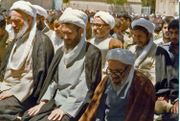Ayatollah
|
|
|
|---|---|
| The Fourteen Infallibles
Muhammad · Fatimah · and |
|
| Concepts
Fourteen Infallibles |
|
| Principles
Monotheism |
|
| Practices
Prayer · Fasting · Pilgrimage |
|
| Holy cities
Mecca · Medina |
|
| Groups
Usuli · Akhbari · Shaykhi |
|
| Scholarship
Marja · Ayatollah · Allamah |
|
| Hadith collections
Peak of Eloquence · The Psalms of Islam · Book of Fundamentals · The Book in Scholar's Lieu · Civilization of Laws · The Certainty · Book of Sulaym ibn Qays · Oceans of Light · Wasael ush-Shia · Reality of Certainty · Keys of Paradise |
|
| Related topics
Criticism |
|
Ayatollah (Persian: آيتالله āyatollāh from Arabic: آية الله, āyatu l-Lāh "Sign of God") is a high ranking title given to Usuli Twelver Shī‘ah clerics. Those who carry the title are experts in Islamic studies such as jurisprudence, ethics, and philosophy and usually teach in Islamic seminaries. The next lower clerical rank is Hojatoleslam wal-muslemin. Ayatollah is simillar in rank to a Bishop or Cardinal in Christianity, and Chief Rabbi in Judaism or a Bodhisattva in Buddhism.
Contents |
Rank

The title is currently granted to top Shia mujtahid, after completing sat'h and kharij studies in the hawza. By then the mujtahid would be able to issue his own edicts from the sources of Islamic religious laws: the Qur'an, the Sunnah, ijmāˤ, and 'aql ("intellect", rather than the Sunnī principle of qiyas). Most of the time this is attested by an issued certificate from his teachers. The ayatollah can then teach in hawzas according to his speciality, can act as a reference for their religious questions, and act as a judge. There is an important difference from Shi'a ayatollahs and "saints" in other religions and Sunni Islam: ayatollahs are not regarded as enlightened by God Himself, but by the Word of God.
There are a few women who are equal in ranking to the ayatollahs, and are known as Lady Mujtahideh. A current example of a Lady Mujtahideh is Zohreh Sefati.[1] Historically, there have been several Mujtahidehs in Shi'ism, most famously the women in the family of Allama Hilli.
History
The name "ayatollah" originates from the Quran where human beings can also be regarded as signs of God, the literal translation of the title. 51:20–21 of the Quran states:
On the earth are signs (Ayat) for those of assured Faith,
As also in your own selves: Will ye not then see?
Grand Ayatollah
Only a few of the most important ayatollah are accorded the rank of Grand Ayatollah (Ayatollah Uzma, "Great Sign of God"). This usually happens when the followers of one of the ayatollahs refer to him in many situations and ask him to publish his Juristic book in which he answers the vast majority of daily Muslim affairs. The book is called Resalah, which is usually a reinvention of the book Al-Urwatu l-Wuthqah, according to their knowledge of the most authentic Islamic sources and their application to current life.
There are around 70 living worldwide; the most famous of them are Grand Ayatollah Ali Sistani, Hossein Vahid Khorasani, Makarem Shirazi, Yousef Sane'i, Malakouti, Haeri, and Sadiq Shirazi. Currently there are four grand ayatollahs in Najaf, Iraq, center of the Iraqi Shi'i seminaries or Hawzas (currently the most senior is Ali al-Sistani). Other grand ayatollahs include Basir Najafi, Mohammad Saeed Al-Hakim, and Mohammad Ishaq Al-Fayyad.
See also
- List of Ayatollahs
- List of Grand Ayatollahs
- Clericalism in Iran
References
- ↑ Official website at sefaty.net
External links
ayatullah ali muhammad mubalighi
